Cotton yarn imports increase sharply, with intensive arrivals of Indian yarn
I China's cotton yarn imports totaled 174.7kt in Aug
According to China customs, China imported a total of 190,000 tons of cotton yarn in Aug 2023, an increase of nearly 28,500 tons compared to July. The total import volume of cotton yarn from January to Aug 2023 is approximately 938,900 tons, indicating a significant increase in domestic imported yarn supply. Currently, the price difference between domestic and imported cotton spot prices fluctuates around 3,000yuan/mt. The prices of Indian cotton and Pakistani cotton are generally slightly lower compared to domestic cotton spot prices, with a price difference between 4,000-5,000yuan/mt. As a result, yarn orders are leaning towards lower-priced cotton-producing regions. Based on the current purchasing pace in the domestic market, the total import volume of cotton yarn for the whole year may reach 1.5 million tons.
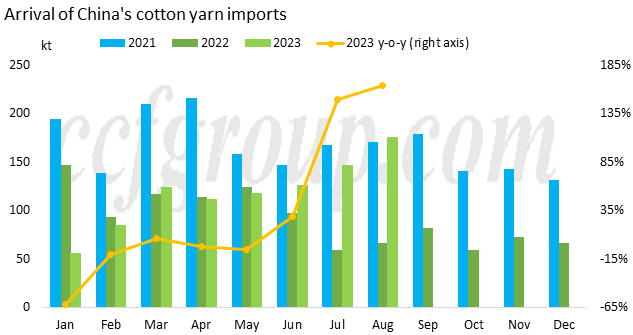
II China's cotton yarn imports by origin
In recent months, the increase in cotton yarn imports has still been primarily from India. In August, India's yarn imports reached 41,500 tons, an increase of 13,500 tons compared to July, with imports accounting for 24% of the total. Vietnamese yarn imports increased by nearly 5,000 tons to 68,200 tons compared to July, but its market share was diluted to 39%. Pakistani and Uzbekistani yarn also saw a slight increase to 29,700 tons (17%) and 12,700 tons (7%) respectively, continuously breaking import records this year.
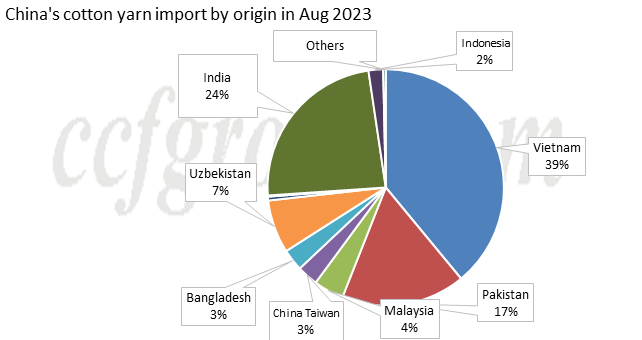
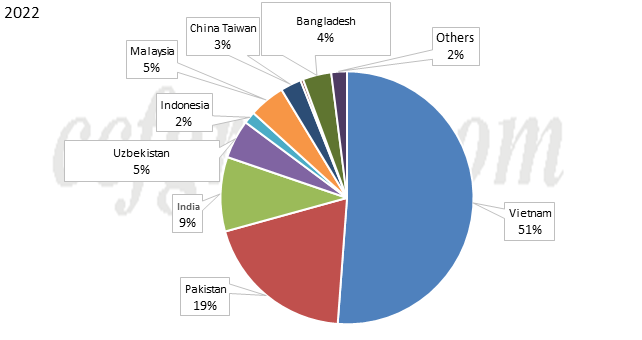
![CYYI7_{3]P$Z(GJLN9`1YOM.png CYYI7_{3]P$Z(GJLN9`1YOM.png](https://pic.ccf.com.cn/2023/10/20231009030100519.png)
In terms of cotton yarn structure, the proportion of combed yarn has been gradually increasing to around 20%. Due to the return of imported yarn to lower price levels, carded yarn 30-47s has started to substitute for domestic yarn to some extent, with the import proportion increasing to 12.33%. In the spot market, the import volume of ring-spun yarn 40s from Vietnam, India, and Indonesia has significantly increased, while the import share of the previous carded single yarn 25s has dropped by nearly ten percentage points. The intensively arrival of cotton yarn imports is partly due to improved profit from previous orders, as well as preparations for the traditional peak season in September and October. However, the increased supply has put some pressure on the spot market, as downstream demand has not rebounded as expected, leading to weaker expectations for spot market transactions.
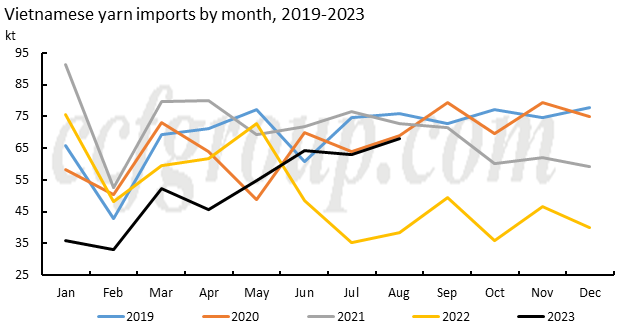
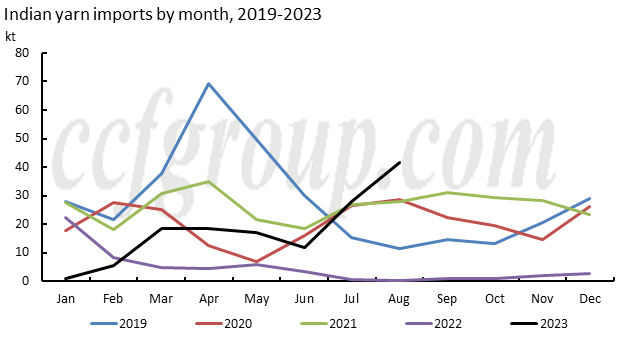
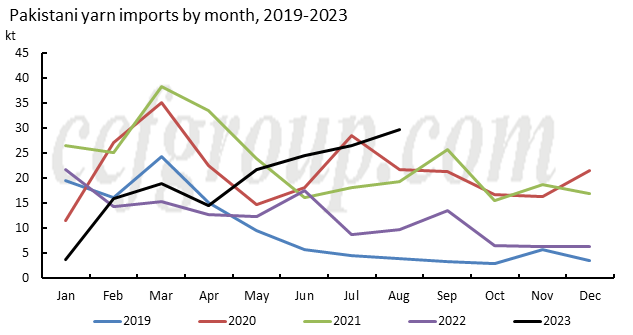
![{J(RD]G~C[[CD({}1LI9N{A.png {J(RD]G~C[[CD({}1LI9N{A.png](https://pic.ccf.com.cn/2023/10/20231009030155754.png)
III China's cotton yarn imports by locations of importers
The price difference between domestic and imported cotton has attracted continuous inflows of funds for yarn imports. From January to August, the import share of Zhejiang Province remained relatively stable at around 24%, while Guangdong Province accounted for approximately 15%, which is similar to last year. Fujian Province has shown strong import expansion in recent months, with the cumulative share rising to 21% from January to August. With the emergence of ordering opportunities, small and medium-sized traders have experienced a rapid recovery in procurement and letter of credit openings, leading to a doubling of cotton yarn import volumes in certain large state-owned enterprises, especially in the Fujian region.
![9W9D3A~@H}5]PVS603EDC(G.png 9W9D3A~@H}5]PVS603EDC(G.png](https://pic.ccf.com.cn/2023/10/20231009034045717.png)
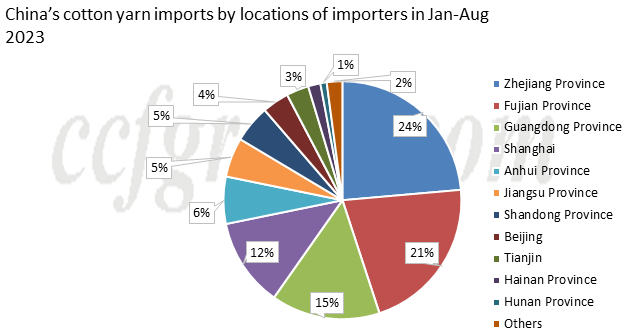
In summary, China's cotton yarn imports have reached new highs this year, with market participants rushing in when there was a significant price difference between yarn spot and futures prices in the early stage. However, the recent appreciation of the exchange rate has eroded the target profits once again. In the future, due to the gradually arrival of new cotton in the international markets, yarn orders may continue to switch to low-cost cotton-producing areas such as India, Pakistan, and Uzbekistan. With the pre-peak season for cotton yarn and the current situation of oversupply, domestic yarn has started to lower prices, resulting in significant sales pressure on imported yarn. In addition to ensuring sufficient exchange settlement space for subsequent replenishment, it is also important to choose differentiated strategies to avoid the vicious competition brought about by price internalization.
- Top keywords
- Cotton Price
- Cotton Futures Price
- Cotton Futures
- CZCE
- PTA Futures Price
- Chemical Fiber
- Polyester Prices
- Wool price
- PTA Futures
- Shengze Silk
- China
- Yarn Price
- price
- China Textile City
- Fibre Price
- Benzene Price
- Cotton
- Index
- Cotton Index
- PTA
- fabric price
- NYMEX
- Top 10
- textile industry
- Spot Cotton
- Cotton Yarn
- Polyester Price
- Futures
- PTA Price
- cotton yarn price

